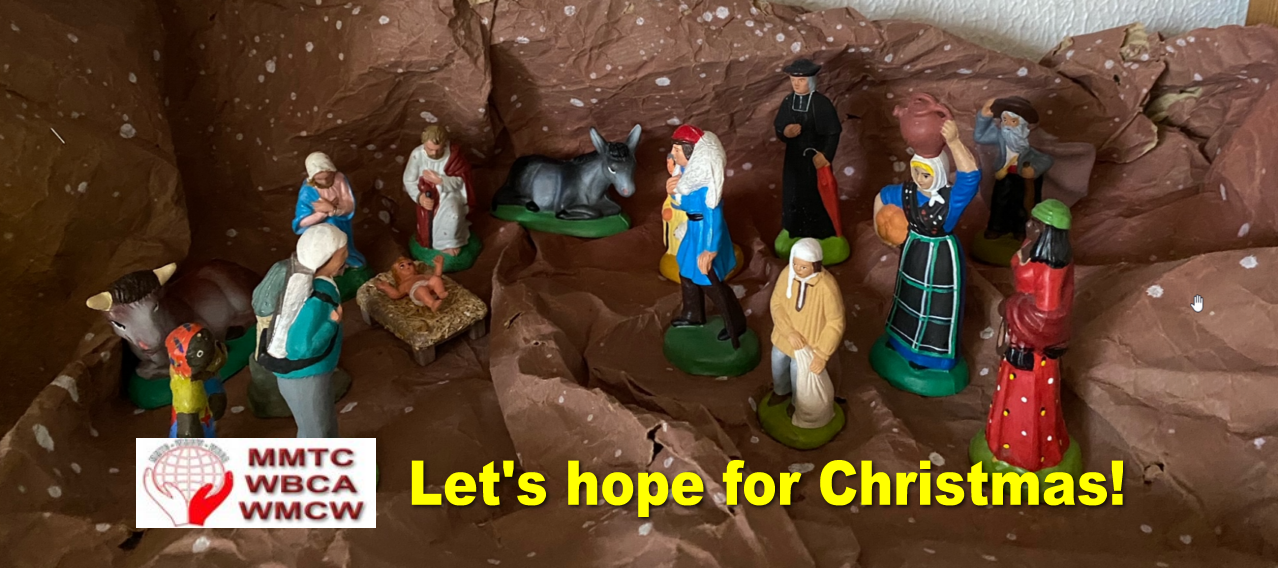
Let's hope for Christmas!
What is Christmas?
Are God, Father Christmas and Jesus some kind of Superman?
Christmas is a time of hope for the residents of our neighbourhoods, working together to improve their daily lives.
Christmas is a time of hope for children's dreams: dreams of extended families, dreams of shared gardens and towns in bloom, dreams of neighbourhood festivities! (...)
Waiting for the Saviour, In the Saviour's tent,
Let's prepare for Christmas!
What is Christmas?
What was the shepherds' compass on Christmas night?
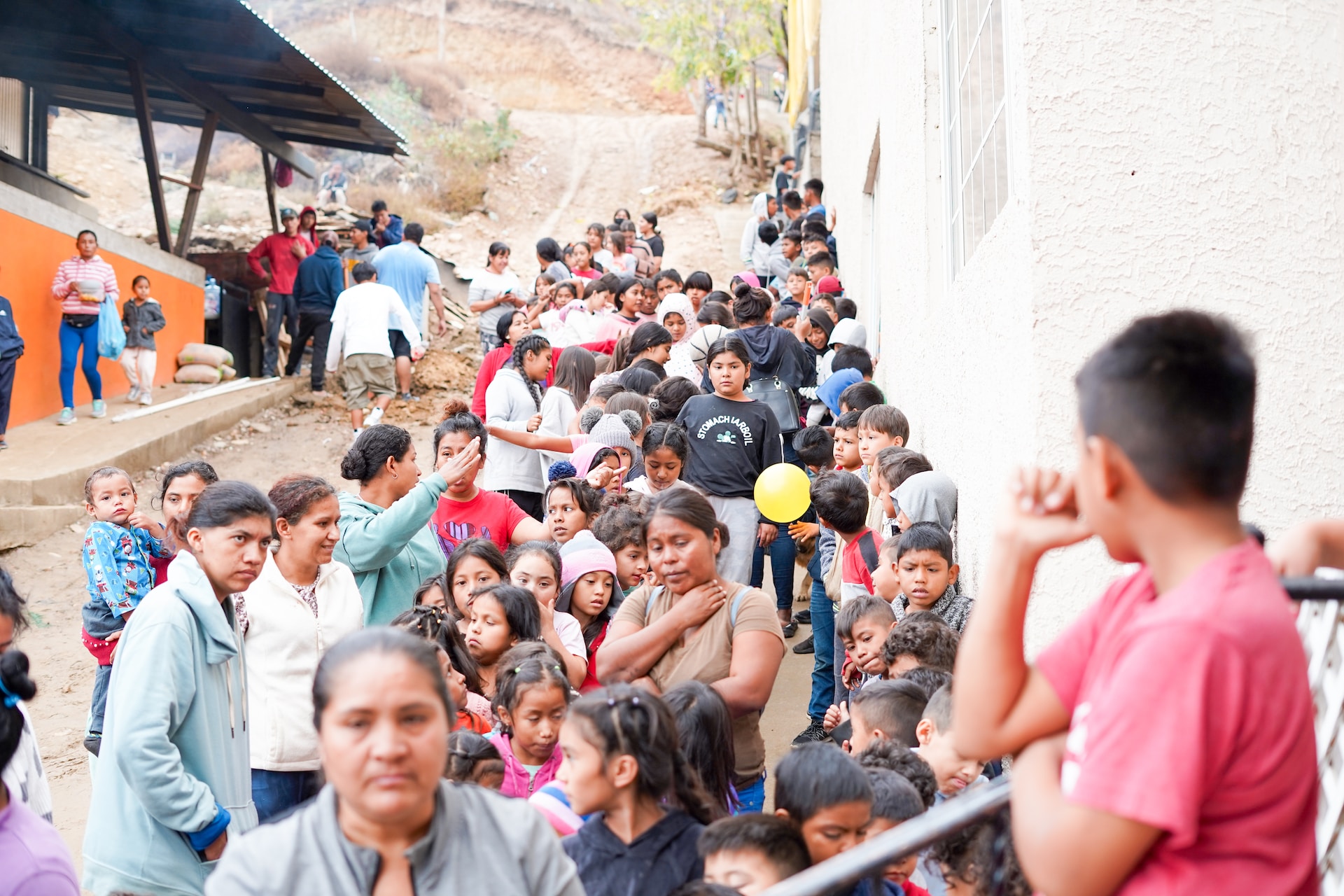
Every year, on the celebration of International Migrants Day on December 18, the World Movement of Christian Workers (WMCW) publishes a message with a double aim: to inform, raise awareness in the community on the situation of migrant workers and promote and strengthen solidarity between WMCW members and migrant workers. Each time, the message is written by a member movement of the WMCW based on the situation experienced in its own country. This year 2023, Guatemala will inspire our reflection and our action.
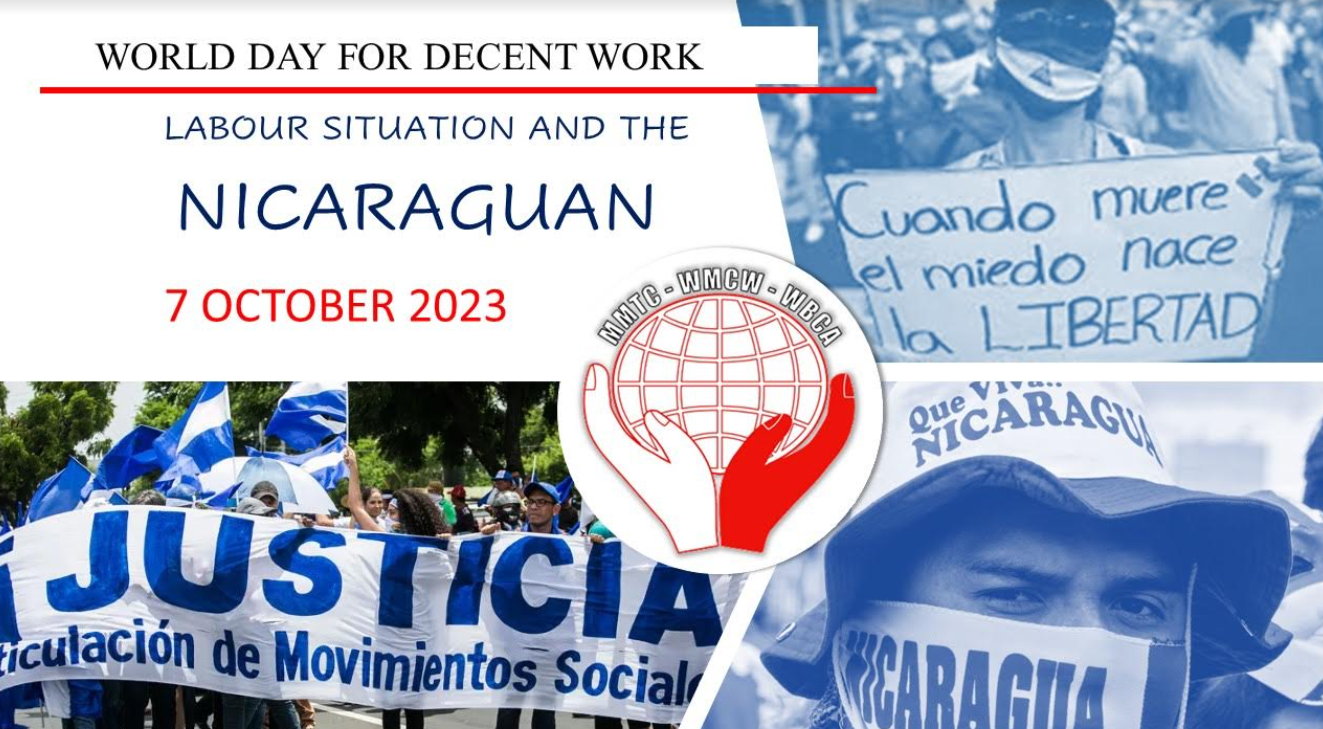
“Decent work is productive work that provides fair income, rights, social protection and supports sustainable economic growth. It is a source of dignity and the foundation of peace, social justice, greater equality”, this is what we find on the ILO website. This year, Nicaragua is witnessing the reality experienced by its population on this subject. Following them, we invite all movements to seize this day to take up this question.
The country is experiencing a strifling and distressing overview for the Economically Active Population (EAP) who aspires to have a decent work and fair wages which fulfills all the basic needs and the expectations that an average family can have in Nicaragua.
At this moment, the economically active population of the country is 3.6 millions of people of which only a quarter part of it has a formal job, the rest of population is underemployed or has an informal job from which they earn some income to support their families.
In general, the population recognises that the lack of employment is the main problem facing Nicaragua.
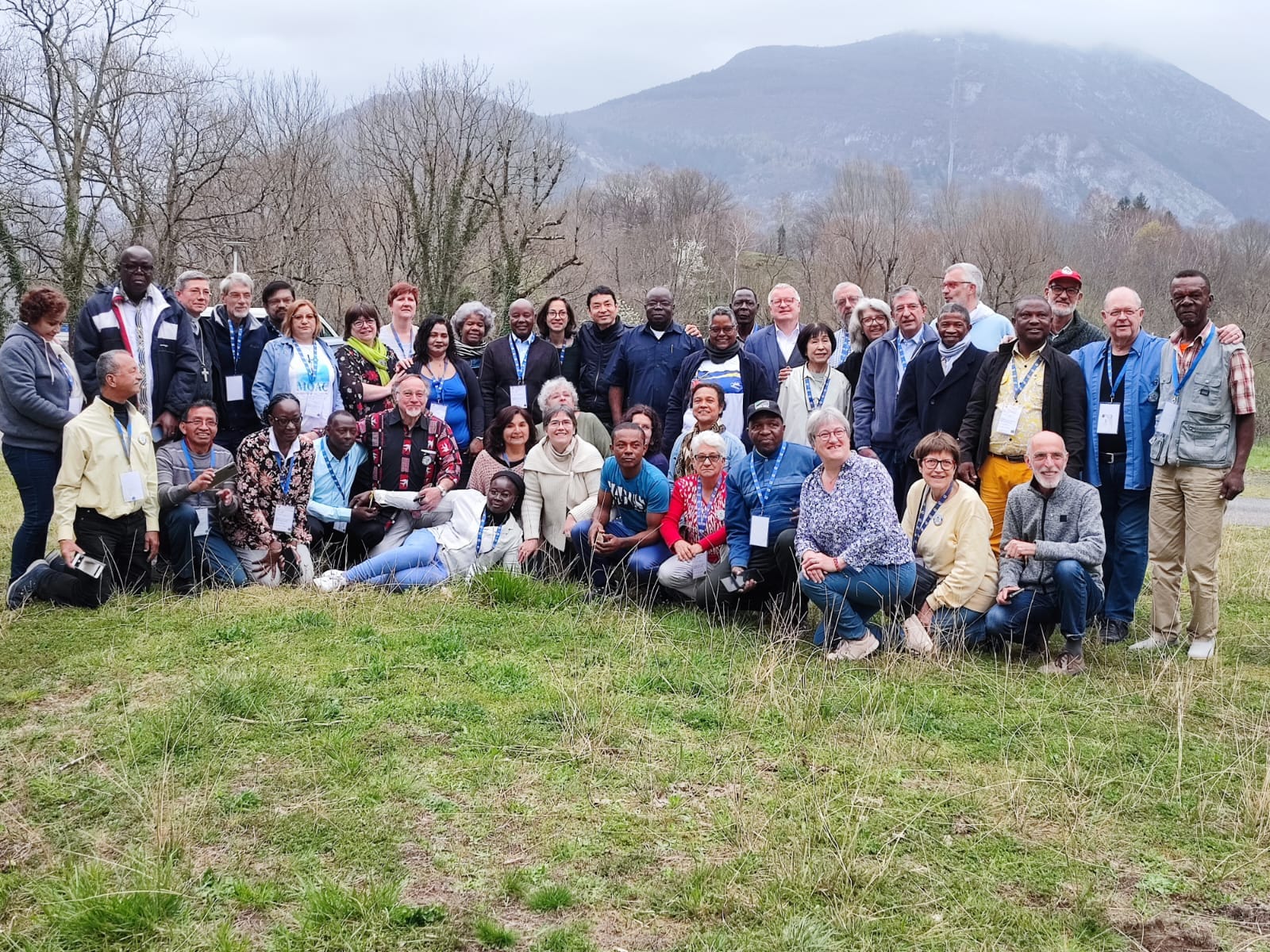
From 24th to 31st March, 2023, 75 delegates representing to movements affiliated to World Movement of Christian Workers, from 25 countries from four continents, met in Lourdes (France), on the occasion of its XIV General Congress.
Under the slogan “Social justice for an economy of life”, we shared workers’ lives of our countries and regions. Using the method See-Judge-Act, we analysed the causes ot the different situations denounced and we decided on the actions to be taken in the global movement and in the local movements.
We have confirmed that the main cause of the dehumanising situations who live workers all over the world is the same one: the unbridled pursuit of profit by the few. This race for money is not only devastating for the human beings, but also it is destroying the environment and depredating the Mother Earth. The whole future of humanity is at stake.
This congress held in France, in the midst of social and trade union mobilisation, we have shown our solidarity with the French workers who are fighting for to respect of their labour rights, threatened by the current government who intends to increase the retirement age and thus to undermine their quality of life,
The migrant situation also drew our attention, especially the youth that, without future in their countries, is forced to leave to other horizons. In these migrations, they are sometimes endagered to die, leaving their families in debt, as happened recently with the tragic fire in a so called “temporary” centre in Juarez City,Chihuahua, Mexico, where 40 Guatemalan migrants died.
We have also highlighted the admirable work of all those people and, particularly of those women, who with their entrepreneurial spirit and initiative are trying to generate independent employment, to find better living conditions in their country.
We also encourage to men and women, driven by their faith in risen Christ, to continue their struggle for greater justice, equality and fraternity. In this sense, we also want to encourage to the youth all over the world to keep fighting for a more just world and to build themselves a future.
Concluding, we have made our own, pope Francis’s words, about “the need to create a new economy of friendship with the earth and an economy of peace”, “to transform an economy that kills into an economy of life”.
May Jesus Worker and Virgin of Lourdes give us light and strength to keep fighting for a social justice and an economy of life,
Lourdes, on 31st March, 2023
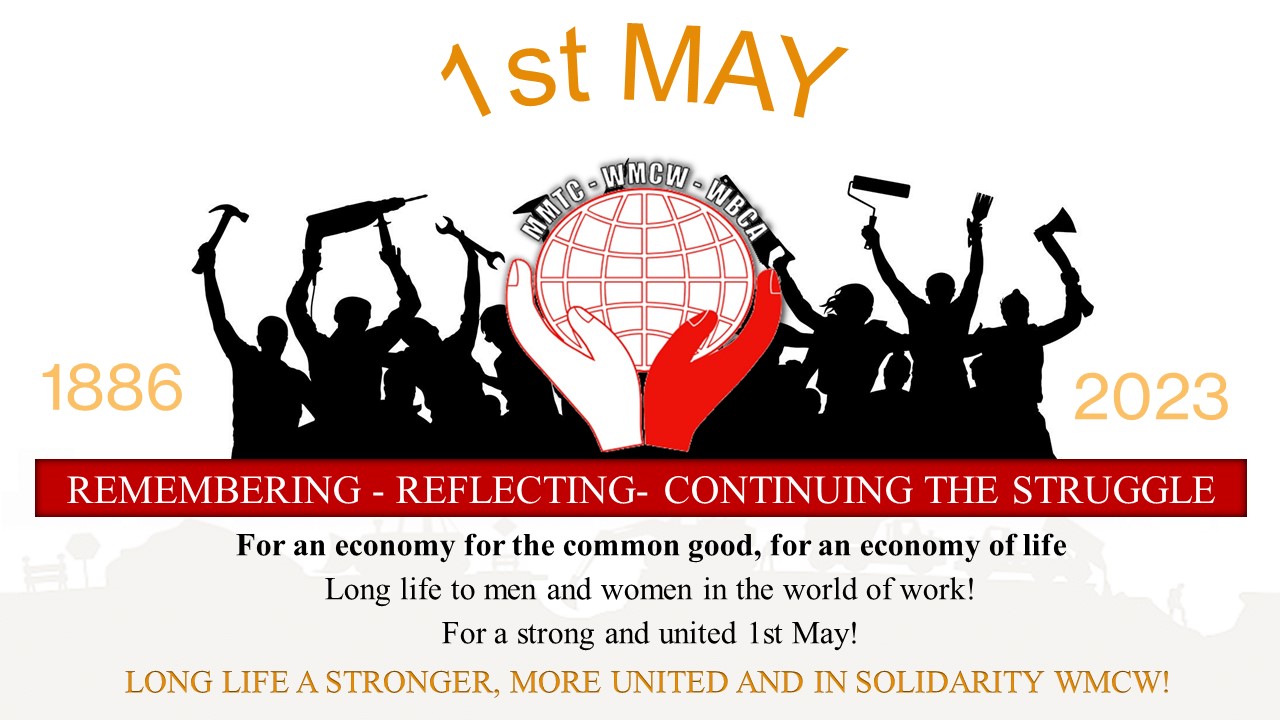
On 1st May, 1886: a great day of mobilisation in all the factories of Chicago (United State) to demand the 8-hour working day. This strike set the basis for the struggle to change the labour and living conditions of workers all over the world, which is still going on today.
In fact, activists of WMCW movements find today with many workers and their families who experience very difficult living conditions due to the precarious work and low wages. Some do not eve have the bare minimum to survive. In some countries, such as Dominican Republic, the social security system only serves to enrich the intermediaries known as “Administrators of Health Hazards” and the Pension Funds which do not guarantee any illness coverage or a fair income in retirement or unemployment. The poorest are excluded from the system.
The economic policy, combined to the post pandemic situation, benefits only one group, while the most of the population can only cover a minimum of the basic family basket of goods. According to UN, the economy in the differente regions in the planet, is not all favourable. It states that for Latin America and the Caribbean, the economic outlook is complicated by the external international conditions that are normalising the macroeconomy, and by a high persistent inflation.
New technologies cause the suppression or devaluation of certain types of jobs, pushing many peopel into the informal economy without any kind of protection or security.
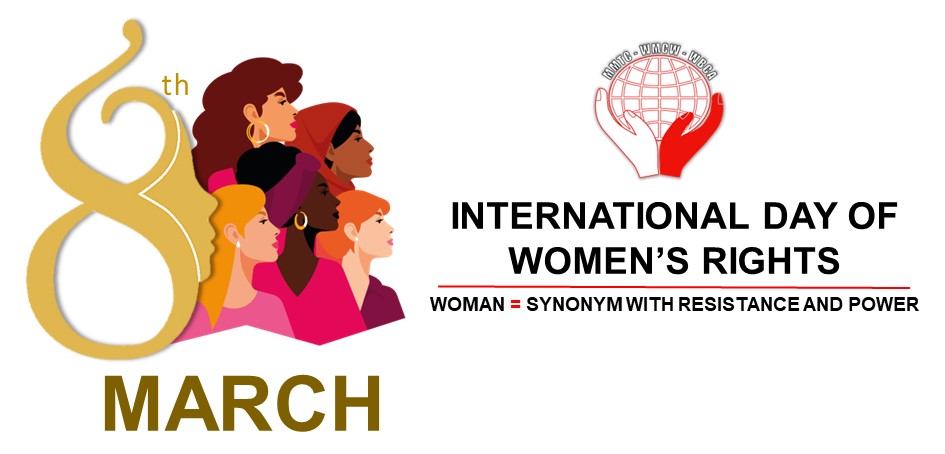
A day strongly rooted in the history of working movement.
In 1910 in Copenhagen, during the 2nd International Socialist Women’s Conference, which gathered to a hundred of women from 17 different countries, the idea of an “An International Women’s Day” was adopted.
The first International Women’s Day was celebrated the next year, on 19th March 1911, to demand women’s right to vote, to work and the end of her discrimination at work.
On 25th March, a fire during a seamstresses’ strike at a Triangle Shirtwaist textile mill in New York kills to 140 of the 500 workers, most of them Italian and Jewish immigrants from Eastern Europe, locked inside the factory. Some of them were only 14. This tragedy, linked to the exploitation of working woman, had a strong impact and later, it was commemorated during the International Women’s Day, that, then, it was linked women’s fight to working movement.
- 18th DECEMBER 2022: MIGRANTS’ DAY MESSAGE
- World Day for Decent Work: Decent Work, a Core Commitment for Peace and Social Justice
- May 1st: Covid19 Lockdown And Its Impact On Workers
- WMCW Message For Womens' Day: "The Challenge Of Going On Caring The Threads Of Life"
- WMCW Message for the Year 2021
- MIGRANTS’ DAY MESSAGE – 18th DECEMBER: "LET’S BUILD BRIDGES, NOT WALLS!
- MESSAGE OF THE HOLY FATHER FRANCIS ON THE OCCASION OF THE FOURTH WORLD MEETING OF POPULAR MOVEMENTS
- Prayer for the World Day of Decent Work
- 7th October, 2021: World Day for Decent Work Message
- IV World Meeting of Popular Movements
- Our comrade Juan Churats passed away
- May First, 2021: WMCW International Statement
- March 8th, 2021: “ Women Leaders for a Future of Equality and Fullness of Life in the Context of the COVID19 Pandemic"
- Statement by the MIACs movements: "From crisis to conversion, an invitation to a more humane world"
- International Migrants' Day: "What is our Human and Christian Responsibility in the Life of a Migrant?
- Life stronger than anything: Special issue of INFOR - December 2020
- Message of the WMCW to ICYCW/IYCW on the occasion of its founder's birthday, Joseph Cardijn
- "Letter to Francis", final document of the World Meeting of People's Movements 2020
- PRAYER “FOR THE WORLD DAY FOR DECENT WORK” 7 OCTOBER 2020
- Message of the WMCW on October 7th: International Day for Decent Work




